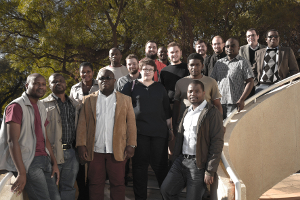Latest News Archive
Please select Category, Year, and then Month to display items
12 October 2020
|
Story Arina Engelbrecht
|
Photo Supplied
 Arina Engelbrecht from Organisational Development and Employee Well-being believes physical activity has a number of benefits for one’s health, including stress relief.
Arina Engelbrecht from Organisational Development and Employee Well-being believes physical activity has a number of benefits for one’s health, including stress relief.
Being physically active plays a big role in preventing the development of mental-health problems and in improving the quality of life of people experiencing mental-health problems.
Treatment for depression
Physical activity can be an alternative treatment for depression. It can be used as a stand-alone treatment or in combination with medication and/or psychological therapy. It promotes all kinds of changes in the brain, including neural growth, reduced inflammation, and new activity patterns are formed that promote feelings of calm and well-being. It releases endorphins – powerful chemicals in the brain that energise your spirit and make you feel good.
Physical activity can be very effective in relieving stress. Research in adults has found that physically active individuals tend to have lower stress levels compared to individuals who are less active. It also leads to improved sleep. When a person sleeps better and feels more rested, overall quality of life improves. They cope better with daily life stressors.
Reduce Alzheimer's risk
Regular physical activity can reduce your risk of developing Alzheimer's disease by up to 50%. It can also slow down further deterioration in those who have already started to develop cognitive problems. It stimulates the brain’s ability to maintain old connections as well as to make new ones.
A study asked people to rate their mood immediately after periods of physical activity (e.g. going for a walk/run, cycling, doing housework) and periods of inactivity (e.g. reading a book or watching television). Researchers found that participants felt more content, more awake, and calmer after being physically active compared to after periods of inactivity.
In conclusion, people who are physically active feel a sense of well-being, feel more energetic throughout the day, sleep better at night, have sharper memories, and feel more relaxed and positive about themselves and their lives.
“Being physically active not only changes your body, it changes your mind,
attitude, and your mood.” – Arina Engelbrecht
UFS International Studies Group makes history come alive globally
2015-07-15

The UFS International Studies Group comprises students who are top achievers drawn from South Africa, Southern and Central Africa and even further afield.
Photo: Charl Devenish |
Headed by Prof Ian Phimister, the UFS International Studies Group comprises six master’s, twelve PhD and twelve postdoctoral fellows who concentrate their research endeavours on African, Imperial and Global History. All of these students are top achievers drawn from South Africa, Southern and Central Africa and even further afield. This group, now only in its third year, presents a phenomenal research output with an international reach.
In the course of the past year alone, five PhD students secured fully-funded invitations to conferences and research seminars in South Africa, Britain, as well as the Netherlands. Our researchers have been publishing articles globally and securing visiting fellowships and research awards.
Dr Clement Masakure and Dr Rosa Williams won funding to present papers at the International Network for the History of Hospitals. Tinashe Nyamunda won a prestigious three-month Cadbury Fellowship at the University of Birmingham in the United Kingdom. Anusa Daimon has been selected as a 2015 Harry Guggenheim award winner, which covers workshop attendance in Nairobi, Kenya.
From among the group, twelve articles have been published or accepted for publication in refereed scholarly journals, as well as four chapters in edited books. Book reviews written by these highly-motivated graduate students, have appeared or will appear in leading national and international academic journals. Remarkably, seven book reviews appearing in one particular issue of African Studies Review, were written by this group. Four scholarly monographs have recently been published, or soon will be. One PhD student is the joint editor (with a senior Canadian academic) of a forthcoming study on Zimbabwe’s controversial Marange diamond mining industry.
Another outstanding researcher, Dr Lindie Koorts, won the award for the best debut writer at the 2014 Woordfees for her book ‘DF Malan and the Rise of Afrikaner Nationalism’ – the first non-fiction writer to achieve this. Her book now appears on the longlist for the 2015 Alan Paton Award.